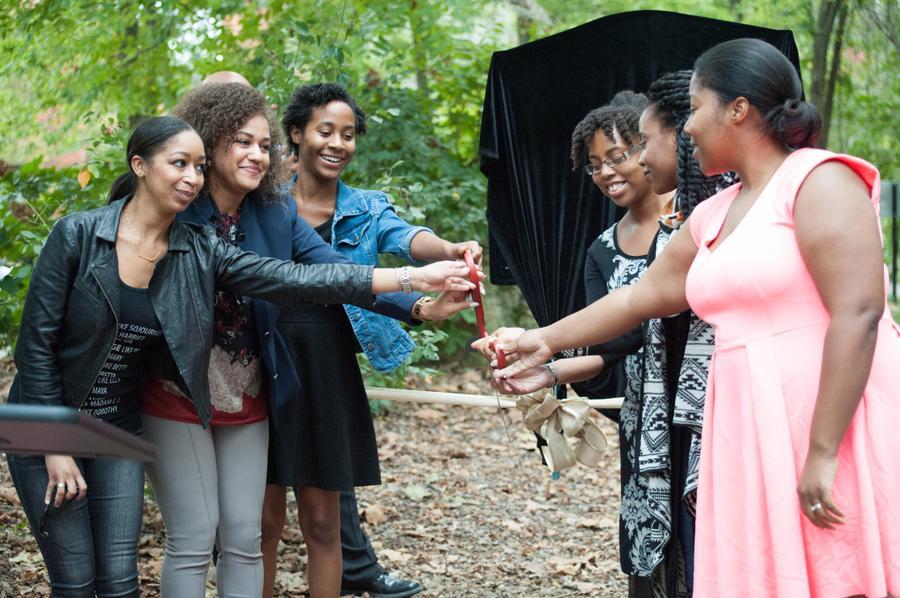
“I know I am going to die, but I am innocent.”
Those were James T. Scott’s last words before a mob of more than 1,000 people lynched him.
Scott, a black man, was working as a janitor at MU’s School of Medicine when he was accused of sexually assaulting 14-year-old Regina Almstedt in 1923. After an identification that was questionable, and further determined to be unreliable, Scott was arrested and taken to Boone County Jail.
Scott was promised a fair trial and “swift justice,” but he didn’t live long enough to receive either. On April 28, 1923, a mob made up of MU students and community members dragged him from his jail cell, threw a noose around his neck and hanged him over the Stewart Road bridge.
All mob members were later acquitted in court.
Scott’s murder was the last public lynching in Columbia.
On Friday, around 80 community members gathered at the entrance of the MKT Trail for the unveiling of a historical marker remembering it.
The movement to raise funds for the marker began in fall 2015 when the 2015-16 board of the Association of Black Graduate and Professional Students created a GoFundMe for donations. Within a few months, enough money had been raised and the city of Columbia approved the project.
The evening’s ceremony began with a libation and African proverb read by former ABGPS President Angela Haeney, followed by speeches by First Ward City Councilman Rev. Clyde Ruffin, Sharp End Heritage Committee member Barbra Horrell and Mayor Brian Treece. The three spoke about the importance of remembering the city’s history and the obligation people have to speak about injustices.
After the ribbon was cut and the black velvet curtain was removed, the crowd moved in to snap pictures of the marker. Then, the event moved to Leadership Auditorium in the Student Center for a reception during which various MU community members spoke.
Haeney introduced the reception with a disclaimer. She said she recognized that many present would feel ashamed, angry or upset.
“Use the uncomfortable feelings as motivation to examine yourself and your biases,” Haeney said.
Former English professor Doug Hunt then delved into the details of the lynching.
Scott was not an “ideal suspect,” Hunt said. He was older than Almstedt described. He held an esteemed position for a black man at the time, and many eyewitnesses testified that they saw him at the Medical School during the time of the alleged rape. But he fit a small piece of the description: He had a “Charlie Chaplin” mustache, and he was black. The authorities needed to arrest someone, and that was evidence enough.
The Columbia Daily Tribune published what Hunt considers a “call to action” after Scott was arrested, urging community members to save their tax dollars and lynch Scott instead of paying to keep him incarcerated.
While Scott was in jail, he shared his cell with the man who did rape Almstedt, Ollie Watson. Watson, who was accused of raping two other high school girls a week before Almstedt was assaulted, was still at large during the investigation. When he heard of the investigation, he shaved off his own Charlie Chaplin mustache. He was never even a suspect in the Almstedt case.
After Scott was murdered, Missouri’s Attorney General released a statement saying the rapist was likely Watson and the mob lynched an innocent man. The Tribune, unwilling to admit its own wrongdoing, denied the possibility of the mistake and published articles saying Watson was innocent.
Keona Ervin, assistant professor of African-American history and faculty affiliate in the department of black studies, then transitioned the presentation to the evolution of lynching, which she believes it is still prevalent today.
“Black death and grieving over black death transcends time,” Ervin said.
Following her talk, a procession of pictures, names and death dates of “unarmed black souls killed by police brutality” flashed across the screen. Over 100 people were killed in 2015 alone.
The auditorium was silent.
Two local poets then performed a 10-minute spoken word piece entitled “The Horror in Missouri,” which reenacted the lynching.
Afterwards, ABGPS thanked the approximately 40 people who attended the reception.
On tables near the doors, there were pictures of innocent black people who were murdered, from Emmett Till to Sandra Bland, reminding people that racism is still alive in the U.S.
_Edited by Claire Mitzel | [email protected]_